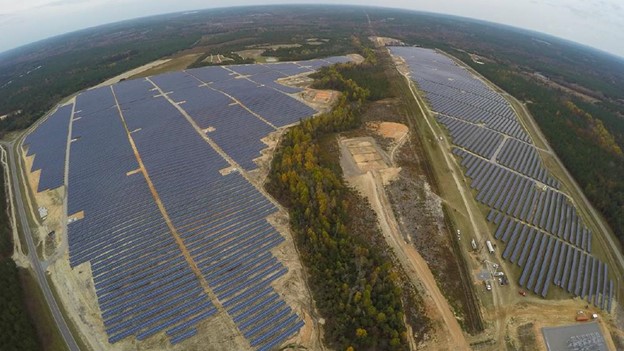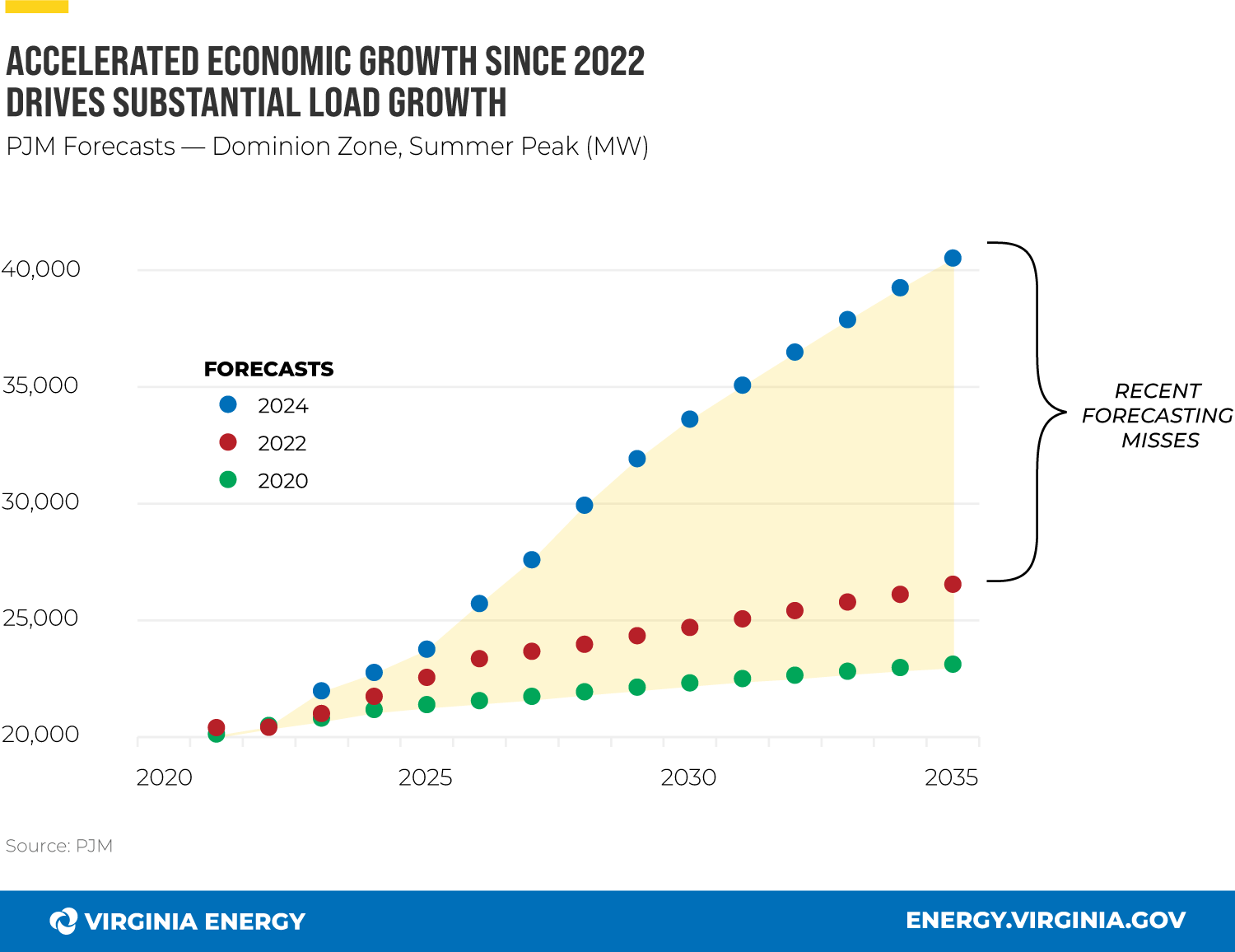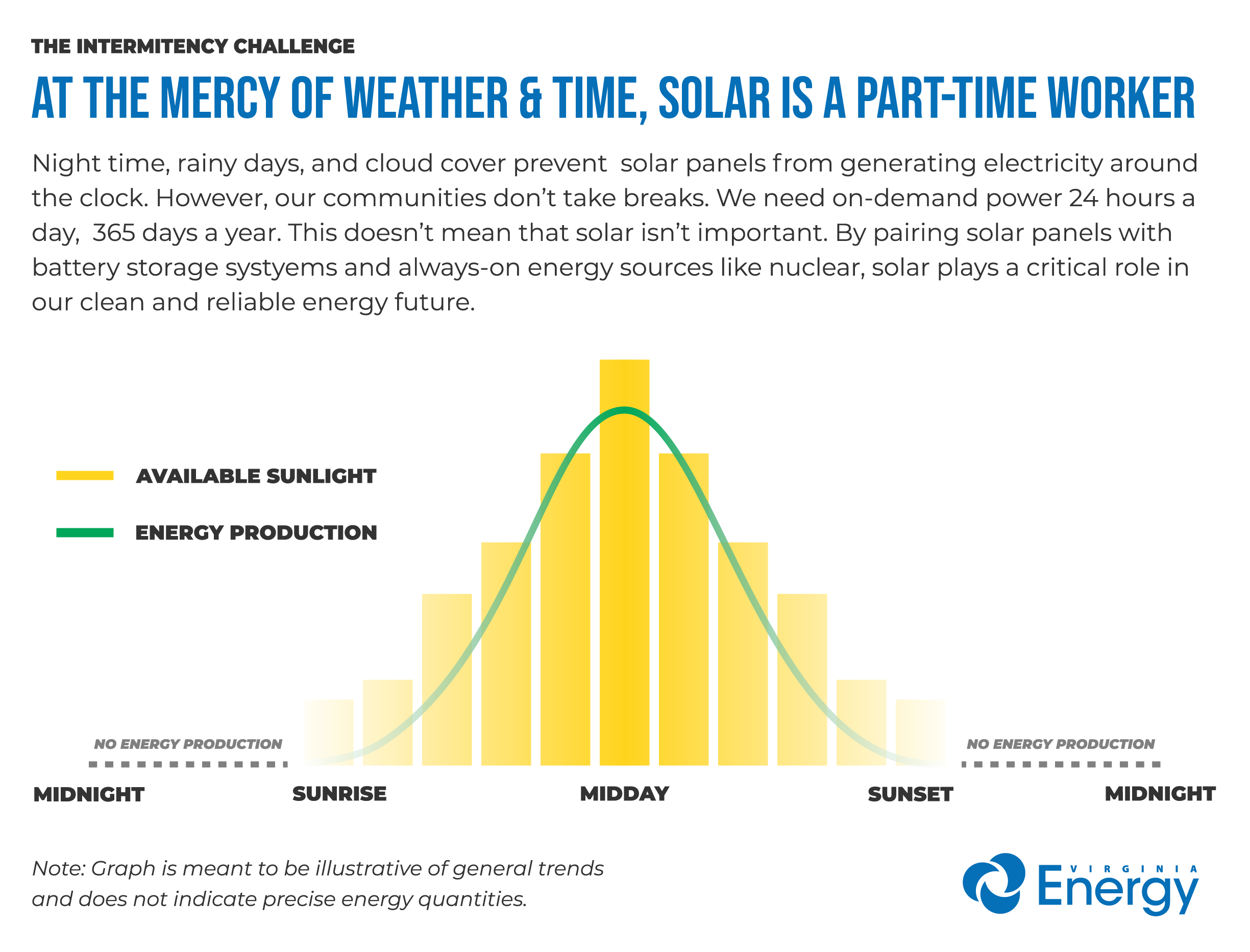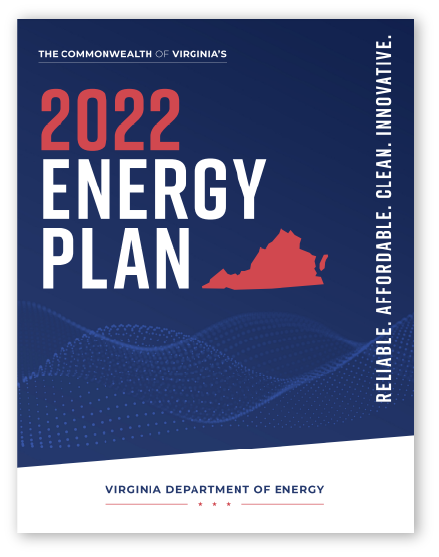Energy Education:
Solar Energy In Virginia
In 2023, Virginia ranked as the 9th largest producer of solar energy in the United States. Today about 5% of Virginia's total power is generated from solar plants (EIA, 2024), with more on the way as additional large scale solar facilities come online over the next decade.
Virginia gets 5% of its energy from solar
As the state experiences an unprecedented boom in AI and data center infrastructure, maintaining our position as the best state for business requires addressing the subsequent unprecedented power demand.
Solar energy, with its potential for sustainable and clean power generation, is crucial in meeting these needs. However, global supply chain issues and reliance on foreign imports pose significant risks to our energy security. Recognizing this, Virginia is committed to developing strategic partnerships and investing in domestic solar manufacturing to reduce dependence on foreign sources.
Virginia Energy's Solar Programs
Virginia Energy Resilience
Virginia Energy and partners are working with economically impacted communities across the state to measure their energy resilience and identify practical long-term solutions to reduce or eliminate vulnerabilities through a $1 million U.S. Department of Energy funded project. Interested in how this can benefit your community? This program will end September 30th.
Learn More Here
Net Metering
Virginia's net metering law allows customers of investor-owned and cooperative electric utilities to install solar or small wind power systems on their premises to generate their own electricity. The law also allows such customers to receive full retail credit for any excess electricity their renewable energy systems generate. Net-metering is currently being reviewed at the State Corporation Commission and updated guidance should be available by early next year.
Learn More Here
SolSmart
Virginia Energy supports the SolSmart no-cost technical advisor program with assistance from the International City/County Management Association (ICMA) to bring solar-specific resources and technical assistance to localities across Virginia.
Learn More Here
Solar and Energy Storage Pollution Control Tax Exemption
Under Virginia law, certified pollution control equipment and energy storage facilities owned or operated by a business are declared to be a separate class of property and may be exempt from state sales and use and local taxation. Virginia Energy is tasked with determining whether such facilities, devices or systems qualify for this certification under Code of Virginia § 58.1-3660 based on information provided by the owner or developer.
Learn More Here
Shared Solar And Community Solar
The U.S. Department of Energy defines a community solar project as one that has multiple subscribers who receive benefits on utility bills that are directly attributable to the project. The Virginia General Assembly passed legislation in 2024 that established a shared solar program for Appalachian Power Company (ApCo) customers.
Learn More Here
Utility Scale Solar
Utility-scale solar installations typically generate 1MW or more and feed directly to the electricity grid. These installations are typically ground-mounted and cover very large areas. Utility-scale projects can take several years to build and must comply with local and state government requirements.
Innovative Reclamation
Innovative reclamation is repurposing mined land to include renewable energy development. Through Virginia Energy's Office of Economic Development, the agency is able to connect operators, land owners, and developers to opportunities on mined land properties.
Learn More Here
Virginia Solar Energy Development and Energy Storage Authority
Effective July 1, 2025, the Virginia Solar Energy Development and Energy Storage Authority was sunset and is no longer active as was established in the Code of Virginia. All previous reports of the Authority can be found here on the LIS Page for reports to the General Assembly.
Energy Education:
Solar Energy Benefits:
Clean Renewable Energy
It's one of the cleanest ways to produce electricity, making it an important part of the solution for reducing the environmental footprint of Virginia's energy sector.
Distributed Generation
Solar panels can be installed on rooftops, in yards, and other available spaces close to where power is needed the most. This helps reduce costs and the loss in electricity that can result from long-distance distribution.
Low Operating Costs
After the upfront costs of installation, solar has very low operating expenses compared to other energy sources. There is no need to purchase fuel and most maintenance costs are minimal.
Scalable Solutions
Solar energy solutions come in many sizes - from small rooftop arrays to massive utility-scale solar facilities. This scalability allows solar to meet a wide range of energy needs for homes, businesses, and utilities.
Land Conservation
Ground-mounted solar facilities can be installed on previously degraded lands that are not suitable for other development, preserving open spaces while productively using the available land area.
Energy Independence
Solar power increases our energy independence by reducing reliance on imported fuels that can be subject to volatile prices and international political crises.
Energy Education:
Solar Energy Challenges
Supply Chain Issues & Reliance on Foreign Imports
In recent years, global economic uncertainty and geopolitical turmoil have put our reliance on foreign energy imports in the spotlight. The U.S. is investing heavily in solar projects at a time when China controls over 80% of global solar manufacturing capacity. This dependence on foreign manufacturing poses a significant risk to our nation's energy security.
Investing in All-American Solutions
Virginia's energy grid cannot be at the mercy of international political and economic whims. Recognizing the important role solar plays in an all-of-the-above energy future, Virginia is working to develop strategic partnerships and is investing in opportunities that build the Commonwealth's solar manufacturing capacity.
Intermittent Power Generation
Because our communities need power 24 hours a day and solar panels only produce electricity when the sun is shining, solar cannot meet all of our electricity needs by itself.
Investing in an All-of-the-Above Solution
Virginia is pursuing an all-of-the-above energy future, combining renewables with nuclear and other energy sources to ensure reliability for the energy grid. Virginia is exploring and investing in solar-plus-storage (battery storage) projects as well as smart grid upgrades to better integrate variable solar output.
Land Use Impacts
Large utility-scale solar facilities require significant land areas, which can potentially disrupt existing ecosystems and habitats if not properly developed.
Environmental Stewardship
Virginia continues to refine its regulation and oversite of the development of solar facilities. State agencies and environmental groups have also collaborated to provide guidance on the responsible development of solar projects. Additionally, the Commonwealth continues to explore opportunities to incentivize more solar on previously mined land, brownfields, capped landfills and other already-disturbed sites.

High Upfront Costs
Keeping Costs Down
While long-term operating costs are lower than other sources, solar installations require a major upfront investment that can be prohibitive for some homeowners and utilities without financing assistance or incentives.
Virginia Energy is pursuing a number of community and shared-solar programs to make residential solar more accessible for consumers. Additionally, Virginia law allows for innovative financing models like third-party ownership which can help make solar more accessible.
Recycling Considerations
Some materials used in solar panels require careful handling at the end of their service life. As older panels are retired, proper decommissioning and recycling practices are important to ensure environmental protection and responsible material management.
Responsible Maintenance
Virginia currently requires all large-scale solar facilities to develop a decommissioning plan before their facility can be approved for public use. Virginia's legislature can continue to develop sensible regulations that ensure energy companies are implementing best practices around the recycling and repurposing of solar panels and components as the technology matures.
Energy Education:
How solar power works
Every hour and a half, enough sunlight hits the earth that it could power the entire world for one year. The trick is capturing all of that potential energy and converting it into usable, reliable power. Watch the video below to learn more about we capture and convert Virginia's sunshine into usable energy for our communities.
Solar 101
From photovoltaic technologies to systems integrations, a wide range of scientific fields contribute to making solar power a reality. For those interested in taking a deep dive into solar energy, we recommend exploring the U.S. Department of Energy's Solar 101 resources available online.
Below is a quick summary of a few of the topics you'll find on their site.
- Solar Photovoltaic (PV) Technology: Solar photovoltaic cells convert sunlight directly into electricity through the photovoltaic effect.
- Solar Thermal Technology: Solar thermal systems use concentrated sunlight to heat a fluid and produce steam, which spins a turbine to generate electricity. Thermal storage allows solar thermal plants to produce electricity after the sun sets.
- Building-Integrated Photovoltaics: Rather than add-on panels, building-integrated photovoltaics (BIPV) are solar cells integrated into construction materials like roofing, siding, windows, and more.
- Agrivoltaics: Agrivoltaics involves co-developing the same area of land for both solar photovoltaic power as well as conventional crop production or animal farming.
- Concentrating Solar: Concentrating solar power (CSP) systems use mirrors or lenses to concentrate a large area of sunlight onto a small area, generating intense heat which is then used to produce steam and drive turbines.
- Solar Forecasting: New solar forecasting technologies use machine learning and weather data to better predict solar energy output across different locations and time scales.
Solar Energy Education:
Research
Re-Evaluating the Land Use Impacts of Utility-Scale Solar Energy Development in Virginia In partnership with VCU Institute of Sustainable Energy and Environment, research conducted to understand the land use trends of the ongoing development of utility-scale solar in Virginia.
Virginia Solar Survey (2022) from the UVA Weldon Cooper Center provides data and information related to each county and city's experience, readiness, efforts and needs related to solar development.
Additional Resources on Solar Energy
Solar Energy Technologies Office at the U.S. Department of Energy provides the latest solar research, data, and educational materials.
Solar Research from the National Renewable Energy Laboratory covers solar cell technologies, systems integration, and deployment analysis.
EIA Solar Data offers detailed statistics on U.S. solar photovoltaic cell and module manufacturing, solar thermal operations, and more.
Interstate Renewable Energy Council (IREC) is a nonprofit increasing understanding of solar energy through research, curriculum development, and workforce trainings.
SEIA Resources by the Solar Energy Industries Association provide reports, factsheets, and toolkits for consumers, policymakers, and solar professionals.



